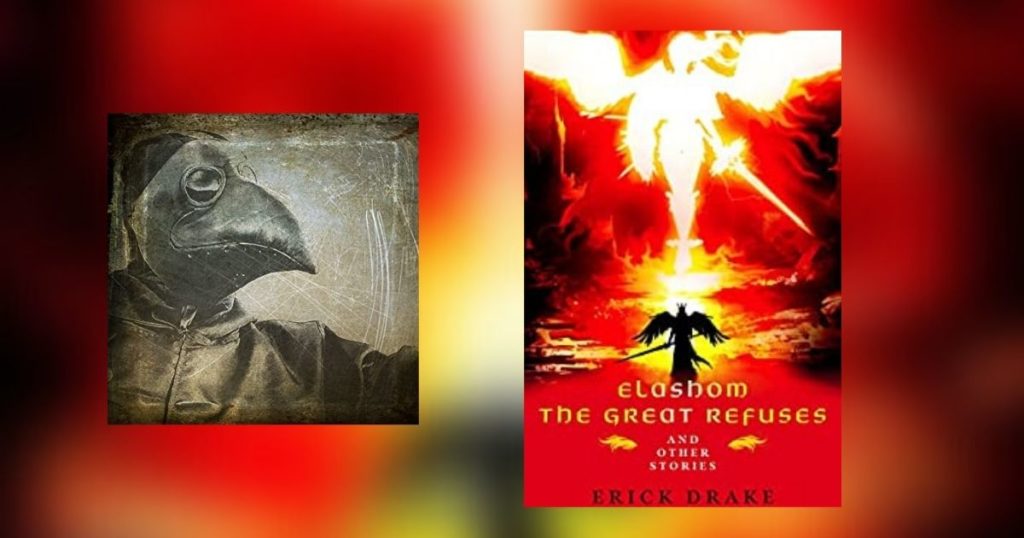What’s the story behind the story? What inspired you to write Elashom The Great Refuses And Other Stories: A collection of dark sci-fi & fantasy short stories?
Not all story ideas have the legs for a full-blown novel or audio play, but yet they pull at my imagination and demand to be written. Short stories are an entertaining way for me to get interesting ideas out of my head and clear the way for longer works – or maybe explore an idea to see if it might develop into something larger. In this collection, both Intercambio and Riven fall into the latter category. The Carpenter’s Tale has suggested a framing device for another series I am developing.
If you had to pick theme songs for the main characters of Elashom The Great Refuses And Other Stories: A collection of dark sci-fi & fantasy short stories, what would they be?
Ooh, let me see . . .
Carpenter: The Badge by Pantera
Gina Halaxi: Time Baby III by Medicine, Robin Guthrie
Joy: These Boots Are Made for Walking
Riven: The Hardest Part / Want To Tear You Apart
Lucy: Jurassitol by Filter
Elashom: In A Lonely Place by Bush (Tricky Mix)
What’s your favorite genre to read? Is it the same as your favorite genre to write?
Well, that depends on my mood, but it is either sci-fi or fantasy. Not high fantasy mind. I’m not really a one for dwarves and elves and such. I prefer something with complexity to it, something like Stephen R Donaldson’s The Chronicles of Thomas Covenant. But I find both genres awe-inspiring in different ways.
What books are on your TBR pile right now?
Eek. Too many. Cold Days, Turn Coat & Dead Beat (Dresden Files Series) by Jim Butcher; Pushing Ice by Alastair Reynolds; The Library of the Unwritten by A J Hackwith; The Salvation Trilogy by Peter F Hamilton; M Is For Magic by Neil Gaiman; Dead Famous & Identity Crises by Ben Elton; Midnight Library by Matt Haigh. And then there are about 15 non-fiction books on various facets/events of the seventeenth century I need to get through by way of research for a new magical reality/alt-history series I have planned. So many books, so little time!
What scene in your book was your favorite to write?
I think it is a scene in Riven where we learn why Riven was in hiding from the Fairy Tale Realm. I don’t know where that came from, the whole sequence just popped into my head and made me laugh. It’s nice when that happens (all too rare though).
Do you have any quirky writing habits? (lucky mugs, cats on laps, etc.)
I wouldn’t call it a quirky habit but I must have silence. I can’t have the TV or music playing in the background because my brain gets distracted and tries to follow what’s being said or sung rather than focusing on the scene I’m trying to write. Still, that’s not too much of a problem as I write between 5:30 and 8:30 am.
Do you have a motto, quote, or philosophy you live by?
As an independent author, I live by the mottos “Fail Fast”, “Feel the fear and do it anyway” & “What’s in front of you”. – “Fail fast” is a working motto. Unlike traditional publishing, Independent authors generally do not have vast armies of experts to handle every aspect of their pre and post-production tasks and so we have to learn on the job. If you allow yourself to be paralyzed by faker syndrome or feelings of inadequacy then you’ll never get anything done. Fail fast gives you permission to fail – failing is ok, provided you monitor and learn from the results. See what works and what does not. If it works, fine. If not, work out what went wrong and go again. Keep doing that until it works (this is not permission to produce poor quality – in each iteration, you always aim for the best you can deliver for your audience given your resources and current skill set). – “Feel the fear and do it anyway” (from Susan Jeffers’ excellent book of the same name) is another way to cope with faker syndrome – it’s fine to feel fear when stepping into the unknown, everyone does. But don’t let it stop you. Acknowledge it and move forward. – “What’s in front of you” – I think this may derive from Stoic philosophy but it basically means don’t be over-awed by the magnitude of the task ahead of you. Plan it out into bite-sized chunks, grit your teeth and do it. Little by little you’ll reduce that mountain to pebbles. This is why we monitor word counts and have daily targets. Sure, a 90,000-word book looks like a huge task at the beginning – but tackling it 1,000 words a day (or whatever your daily word target is) means that 90 days later, you’ve got yourself a novel.
If you could choose one thing for readers to remember after reading your book, what would it be?
It would have to be my personal note after the Intercambio story. If you think you have mental health issues, talk to someone. Get help. You are not alone.
Erick Drake is the author of the new book Elashom The Great Refuses And Other Stories: A collection of dark sci-fi & fantasy short stories
Connect with Erick Drake
Author Site
Sign up for our email and we’ll send you the best new books in your favorite genres weekly.
